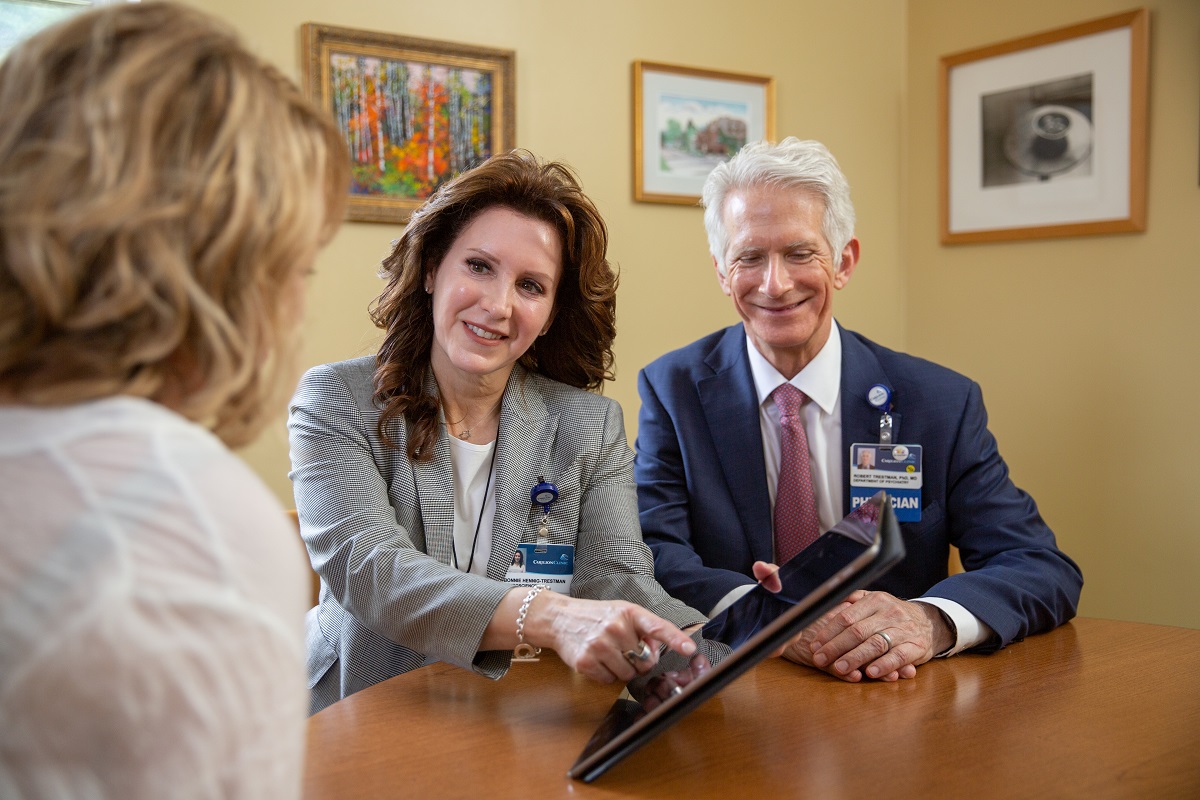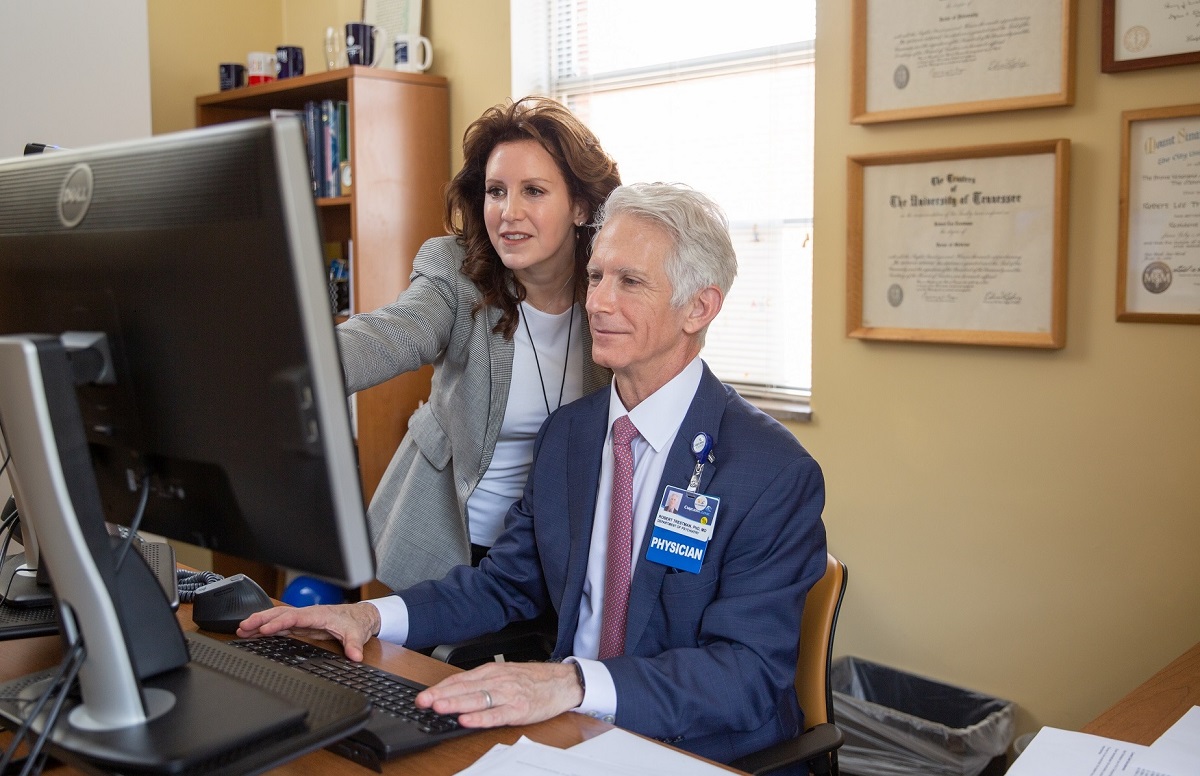Huntington's Disease Program
The Huntington’s Disease (HD) Program is designed to provide education, support and treatment to individuals impacted by this genetic, progressive, neurodegenerative disorder.
Services

Huntington's Disease Program
The Carilion Clinic Huntington’s Disease (HD) Program is a collaboration between Neurology and Psychiatry. The program is designed to provide education, support and treatment to individuals who are at-risk for HD, people who have tested positive or negative for the HD gene, people with symptoms of HD, and families who are coping with a loved one impacted by HD. Program Director Bonnie Hennig-Trestman, L.C.S.W., D.S.W., specializes in the treatment and care of patients and family members affected by HD.
The program offers:
Support for People At-Risk or Symptomatic of HD
- Assisting with the decision to test for HD for people who are at-risk
- Testing for the HD gene
- Integration of treatment of the physical, psychological and cognitive symptoms
- Referrals to multiple disciplines
- Assistance with benefits including social security disability
Family Support
- Teaching family-based approaches to managing HD symptoms
- Assisting with family coping and social impact of HD
- Providing support to young people impacted by having a loved one with HD
- Planning for the future
Our Team

Bonnie Hennig-Trestman, L.C.S.W., D.S.W.
Director, Carilion Clinic Huntington’s Disease Program
Assistant Professor, Virginia Tech Carilion School of Medicine, Department of Basic Science Education
540-521-8306
Dr. Bonnie Hennig-Trestman has over 30 years of expertise providing and guiding clinical services to patients and family members suffering from neurodegenerative, physical and psychiatric illnesses. She is the Director of the Carilion Clinic Huntington’s Disease Program in Roanoke, Virginia; Assistant Professor at Virginia Tech Carilion School of Medicine in the Department of Basic Science Education; and the Special Programs Director at HD Reach in Raleigh, NC. She has over two decades of experience working with people who are impacted by Huntington’s Disease.
In 2003, Dr. Hennig-Trestman authored “Talking to Kids About HD,” now in its second edition and available in multiple languages. She has given educational lectures to national and international audiences, conducts funded research related to children impacted by Huntington’s Disease, and has published on various HD-related topics in peer-reviewed journals. As a member of the Huntington Study Group (HSG) she serves as the Co-Chair for the HSG Credential Committee. Since 2013 she has worked closely with the Huntington’s Disease Youth Organization (HDYO) and has attended all five North American HDYO Camps serving as a staff member. In 2017 she was appointed to the HDYO Board of Directors as the Research Co-Chair. She is a member of the European HD Network (EHDN) and participates in the EHDN Pediatric Working Group.
For more information about HD or to schedule an appointment with Dr. Hennig-Trestman, call 540-521-8306.
Robert Trestman, Ph.D., M.D.
Chair, Psychiatry and Behavioral Medicine
Professor, Virginia Tech Carilion School of Medicine
Referrals are also accepted through EPIC.
Patients and family members are seen at the HD Program in the Neurology Department at 3 Riverside Circle or virtually through MyChart.
About HD

About Huntington's Disease
Huntington’s Disease (HD) is a genetic, progressive, neurodegenerative disorder. This means that HD is a brain disease that is passed down from generation to generation and gets worse over time.
Our bodies are made up of millions of cells. The cells contain about 50,000 genes. Genes are our body’s blueprint which provides instructions for cells to make proteins. Proteins allow the cells to grow and have different functions. We all have a gene that makes a protein call Huntingtin. We know our bodies need this protein. Sometimes there is a change, or mutation, which causes this gene to act differently. Instead of producing a protein our body needs, this gene produces a protein that is toxic to cells.
People who are at-risk for HD, meaning they have a biological parent with HD, will become symptomatic if they inherit the mutated gene from the parent with HD. If they don’t inherit the HD gene they will never have HD. Since the HD gene doesn’t skip generations, people who are negative for the HD gene won’t pass it on to their children.
If a person does inherit the gene that causes symptoms of HD, they will typically experience symptoms between 30 and 50 years of age. There is however a type of HD called Juvenile Onset HD (JoHD) which affects young people. There is also late onset HD which affects people when they are older.
There are three groups of symptoms that occurs with HD. It can be helpful to remember these symptom groups with the letter M. The three symptom groups are:
- Mood (Personality Changes, Anxiety, Depression)
- Memory (Difficulty with Organization, Planning, and Concentration)
- Movements (Involuntary Movements Called Chorea or Dystonia)
Resources
Organizations
Access important HD resources below. For more information, please contact Dr. Bonnie Hennig-Trestman at 540-521-8306.
From the Experts
Cards
It can be difficult for a person who has symptoms of HD to let others know about the illness. Called anosognosia, the person might not be aware of involuntary movements; problems with remembering, concentrating and thinking, or even that they are irritable or anxious.
When a person with symptoms of HD has anosognosia and is in public, they may behave differently than others expect. The following business-style cards include information about HD and fillable personal details. The caregiver card option notifies others of any potential emergent need to help loved ones with HD.
Please download and print these cards. To request printed copies, please contact Dr. Bonnie Hennig-Trestman at 540-521-8306.
CarilionClinic.org contains Huntington’s Disease related publications and links to other websites or content belonging to or originating from third parties. Such external links are not monitored or endorsed by Carilion Clinic. You agree that use of this information is at your own risk and hold Carilion Clinic harmless from all claims.
Support
Carilion Clinic Foundation
If you are interested in making a donation to the Carilion Clinic Huntington’s Disease Program, visit the Carilion Clinic Foundation webpage, scroll to “Designation” and select “Other” to fill in Huntington’s Disease. We appreciate your contribution.